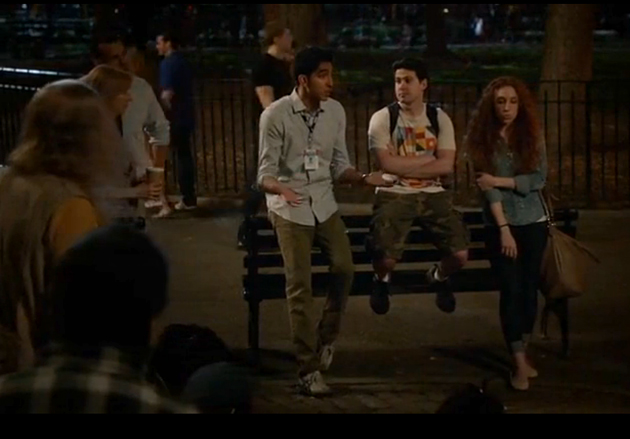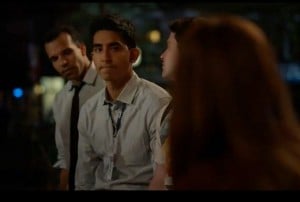Occupied by The Newsroom
On inspiring (probably, maybe) a Newsroom plot arc
Thirty-six minutes into the first episode of the second season of The Newsroom, the dorky young News Night staffer Neal Sampat arrives at a nighttime meeting of protesters in a park. “I see some new faces,” says the anthropology Ph.D. student running the meeting, “so I have to say up front: no police and no reporters.” Watching it, I suddenly had the feeling of being on both sides of the screen at once. In my February 2012 Harper’s article about Occupy Wall Street, “Some Assembly Required,” I quoted the original wording that was used: “No cops or reporters.”
Unlike Neal, who sits in silence with his press credentials hanging around his neck until he is called out, I identified myself voluntarily, but what follows for Neal is something like what I described — a period of “interrogation and harrowing debate,” complete with perplexing hand signals, about whether I could stay. By the end, I was the first reporter allowed to stick around for Occupy Wall Street’s pre-occupation planning meetings, which formed the basis of the Harper’s article as well as of my new book, Thank You, Anarchy: Notes from the Occupy Apocalypse.
I have yet to receive a response from The Newsroom’s writing staff to confirm or deny that my article was the primary source for subplot, which lasts for another few episodes. (I even tweeted my question at someone who said he was on an airplane with Aaron Sorkin.) I probably can’t take it as a sign that Neal Sampat and I have the same initials. But even though I don’t work for a hard-hitting TV news show, I can relate to Neal’s experience of being ridiculed for proposing a story about the impending occupation to the news staff, who laugh out loud at him in a meeting. Neal’s credulity was illustrated in an earlier episode, when he tried to argue that Bigfoot is real — and in the earliest days of Occupy, when I pitched the story to various publications, I might as well have been proposing pieces on Bigfoot; mostly what I got was silence or a brief no-thank-you.
Some Occupy veterans have complained that The Newsroom’s depiction doesn’t do justice to the best ideas and impulses of the movement, but, truth be told, neither did the movement itself. The show’s Occupy “leader,” the aforementioned anthropologist Shelly Wexler, is as ineloquent as many of her real-world counterparts were at the beginning. During one of those planning meetings, I got so fed up after three and a half hours of gruesome argument that I got up and left. I was often tempted (and sometimes gave in to the temptation) to do as Neal did in offering Shelly advice: stick to one demand, keep it reasonable, keep it simple.
“Bring that up at the next meeting,” Shelly replies as she storms off. “I’ll show you the hand signals.”
Occupy may have developed a new populist rhetoric that contributed to the defeat of one-percenter poster boy Mitt Romney, but there are few signs that the movement changed the media’s dismissive attitude to protests. Last July, Washington Post ombudsman Patrick B. Pexton made the sensible proposal that newspapers have a permanent beat for covering resistance movements, “using social media and engagement tools to help draw the groups and their adherents (or opponents) to Post coverage before, during, and after demonstrations.” Somehow I doubt the paper’s new owner, Jeff Bezos, will be making that a priority.
In a subsequent episode of The Newsroom, there’s a painfully awkward reconciliation scene between Shelly Wexler and Will McAvoy, the show’s starring anchor, who has recently humiliated Wexler on the air. She wants him to apologize for being so smug. He replies by confessing that he ridiculed her and her movement in order to soothe his own chronic self-doubt.
“I’m not smug,” he says. “I’m having a crisis of confidence.”
It could happen. When Occupy became one of the biggest stories in the world for a month or two, one editor I’d pitched actually emailed me to apologize.





